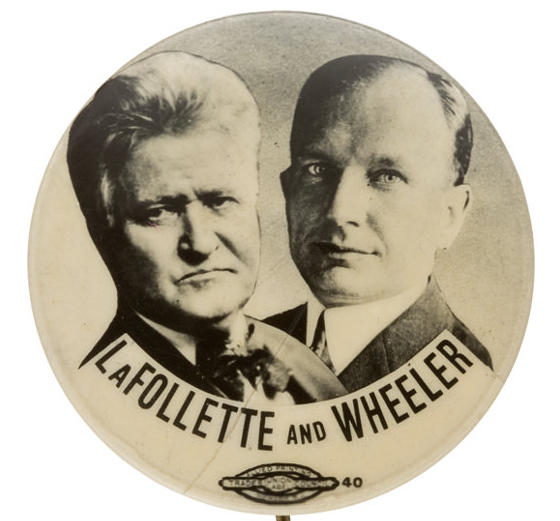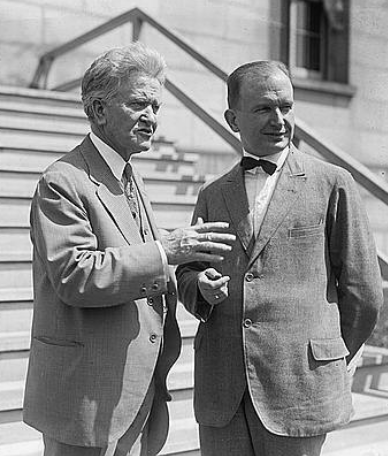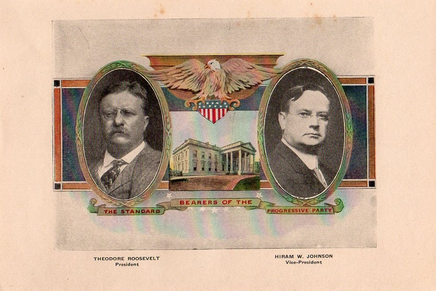Note how Sen. La Follette makes up for the height difference in spite of the tall hair
Wheeler and 1912 Progressive Party VP nominee Sen. Hiram Johnson
Burton Kendall Wheeler, February 27, 1882 (Hudson, Mass.) – January 6, 1975 (Washington, DC)
VP candidate for Progressive Party (aka Independent Progressive Party) (1924)
Running mate with nominee: Robert M. La Follette (1855-1925)
Popular vote: 4,831,706 (16.61%)
Electoral vote: 13/531
The campaign:
Wisconsin Republican Senator Robert La Follette and Montana Democratic Senator Burton K. Wheeler combined forces in a significant third party effort that enjoyed high voter turnout in the Northwestern quarter of the US and the Far West. More agrarian and radical than the the previous Bull Moose Progressive Party, this new incarnation even gained the endorsement of the Socialist Party of America and the American Federation of Labor.
The VP nomination was first offered to Justice Louis Brandeis, who declined. Wheeler was then given the opportunity and after some consideration decided to accept. He did not renounce his loyalty to the Democratic Party, but could not support Davis. "I am a Democrat but not a Wall Street Democrat," Wheeler explained. He also wanted to use the VP nomination as a way to make his Senate investigations into the Harding scandals more public.
The platform included stands that were anti-monopoly, pro-free speech, pro-equal rights for women, pro-public ownership of utilities, promotion of public works, pro-public control of natural resources, pro-union, and anti-war.
Wheeler used the empty chair gimmick while "debating" an absent Coolidge apparently to great acclaim. Clint Eastwood attempted the same showmanship at the 2012 Republican National Convention but comic timing was not his forte.
It was the 5th largest popular vote percentage for a third party in US history, surpassed since then only by Ross Perot in 1992. It was the 7th best third party vote from the Electoral College.
On the ballot in every state except Louisiana, the La Follete/Wheeler ticket won the standard bearer's home state of Wisconsin (53.96%) and placed second in 11 more states, nearly winning in North Dakota. After Election Day La Follette and Wheeler returned to their parties of origin.
Wheeler later reflected: "Our trouble was that we were ahead of the times. The Progressive Party platform of 1924 became the ideological basis for the New Deal in 1933 and much of it found its way to the statute books by 1935."
Election history:
1910-1912 - Montana House of Representatives (Democrat)
1920 - Governor of Montana (Democrat) - defeated
1923-1946 - US Senate (Mont.) (Democrat)
1946 - Democratic primary for US Senate (Mont.) (Democrat) - defeated
Other occupations: traveling book salesman, stenographer, attorney, Delegate to the Democratic National Convention 1932-1940, US District Attorney of Montana 1913-1918
Buried: Rock Creek Cemetery (Washington, DC)
Notes:
Buried in the same cemetery as Alice Lee Roosevelt Longworth, Frank Mankiewicz, George S.
McGovern, Tim Russert, Upton Sinclair, and Gore Vidal.
Was headed to Seattle to start his law career but lost his shirt in a poker game in Butte, Mont. along
the way and stayed.
Author of the Wheeler Resolution limiting AM radio to 50,000 watts.
Broke with FDR over the court-packing plan and later became an isolationist until Dec. 7, 1941.
Isolationists urged him to run as a third party presidential candidate in 1940.
If La Follette/Wheeler had won in 1924, Wheeler would have been President June 18, 1925 upon the
death of La Follette.






























